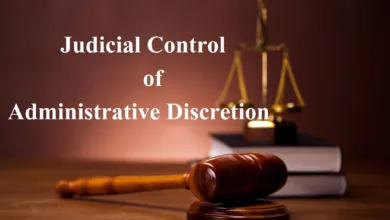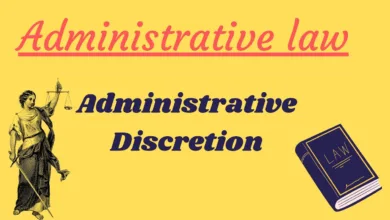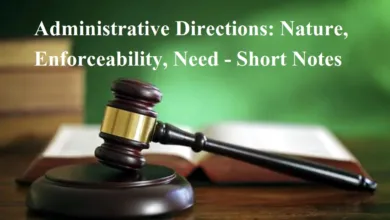Administrative Actions: Meaning, Nature, Scope, Significance and Case Laws
These notes elaborate on administrative actions, their classifications, scope, significance, and the role of judicial review in maintaining fairness and control over administrative authorities' actions.
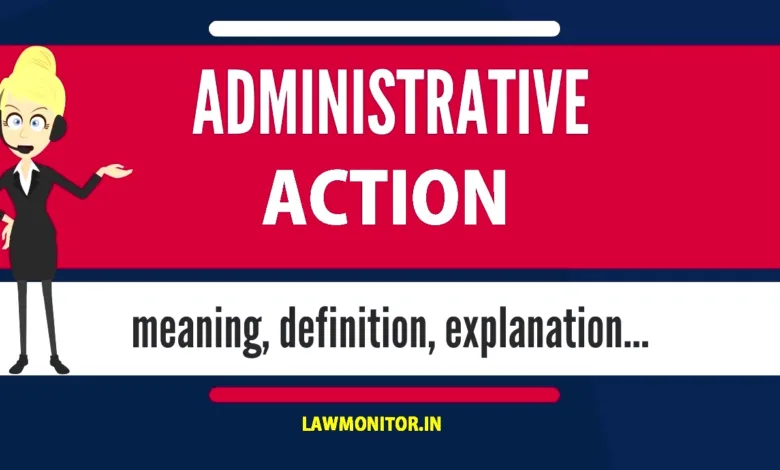
These notes elaborate on administrative actions, their classifications, scope, significance, and the role of judicial review in maintaining fairness and control over administrative authorities’ actions.
Definition:
- Administrative actions are operations within administrative law, focusing on the powers and functions of administrative authorities.
- They pertain to legal actions tied to public administrative bodies, aiming to protect the public and uphold societal law and order.
- Not legislative or judicial in nature; they enforce or refrain from enforcing specific actions by an authority.
Characteristics and Types:
- Quasi-Legislative Action: Involves the administrative body exercising delegated law-making powers (e.g., Civil Servant Efficiency rules 1973, Conduct Rules).
- Quasi-Judicial Action: Administrative acts with judicial characteristics, such as disciplinary proceedings against students or employees for misconduct.
- Fully Administrative Action: Application of legislative rules to specific cases, like transferring civil servants or appointing inquiry officers.
Nature and Scope:
- Administrative actions aren’t solely restricted to administrative, quasi-judicial, or quasi-legislative roles; they encompass various activities.
- Actions not falling under legislative or judicial categories constitute administrative actions.
- They can be statutory (having the force of law) or non-statutory and are subject to judicial review if they violate natural justice principles or citizens’ rights.
Significance:
- Reducing judicial workload: Quasi-judicial and quasi-legislative bodies help alleviate the burden on the judiciary by handling certain cases.
- Emergency response: During crises like war, administrative actions offer effective solutions due to the executive’s authority to address such situations.
- Power for public good: Administrative authorities wield powers used efficiently for the benefit of citizens, executed through diverse administrative actions.
Judicial Review and Control:
- Administrative actions must adhere to fairness principles; any deviation invites potential judicial review.
- Challenging in court: Individuals or corporate bodies can challenge administrative actions in a court of law.
- Court intervention: The Supreme Court, under Article 32 of the Indian Constitution, holds the power to issue writs for controlling administrative actions.
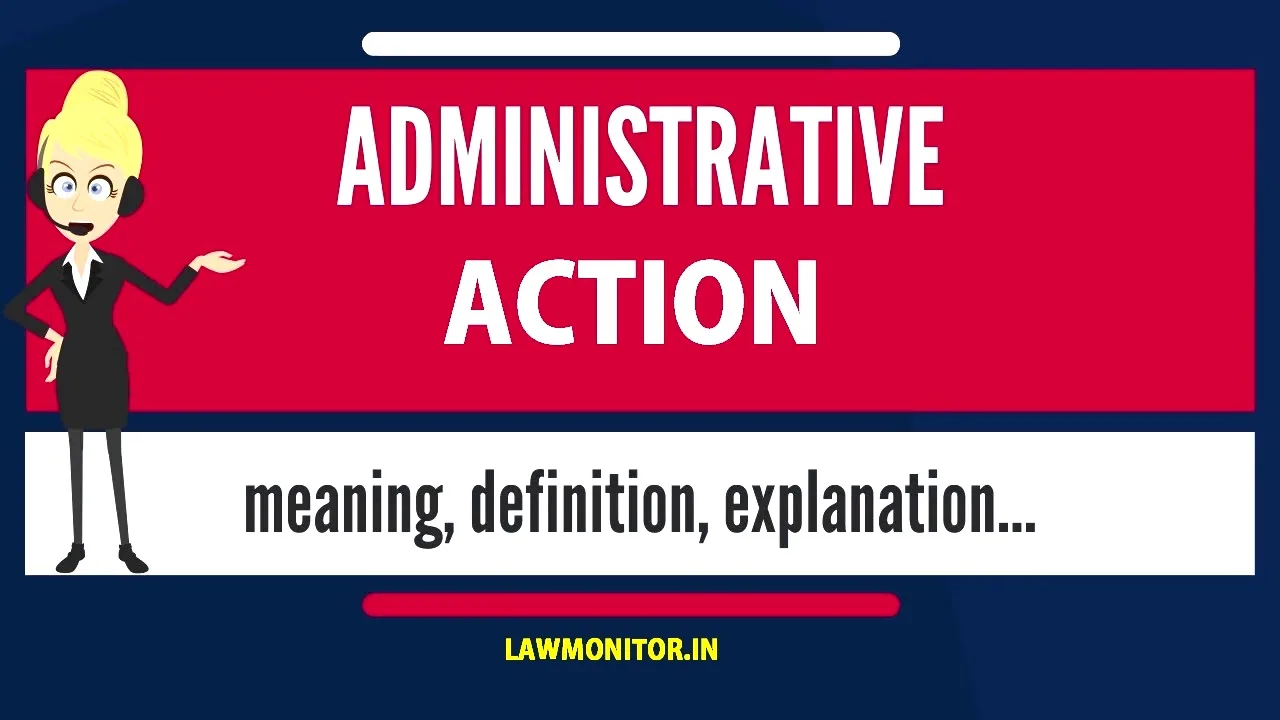
Case Laws dealing with Administrative Actions
Sat Pal Singh v. Union of India and Ors.
Facts:
- The petitioner, a Border Security Force Lance Naik, fell ill during special leave and was unable to report back for duty due to an accident.
- Consequently, he received an order of removal from service passed by the Commandant 44 Bn BSF., which he challenged through appeals and then a writ petition under Article 226 of the Constitution.
Decision:
- The Court found the administrative action taken against the petitioner lacked proper application of mind and reasons as required under Rule 22.
- Directed the authorities to initiate fresh departmental proceedings, providing the petitioner with an opportunity and following due process.
Full Case of Sat Pal Singh v. Union of India and Ors.
The petitioner was designated as Lance Naik in the Border Security Force, he was even promoted to the rank of Head Constable later. The petitioner along with the other participants in sports was allowed special leave. He proceeded to his home station in Bam Loni, District Rohtak on 6.9.2005 and was to report back for his duty on 17.10.1995. The petitioner fell sick between 30.09.1995 to 6.12.1995.
On 7.12.1995, the petitioner, with an intention to join his duties, took lift in a civil truck, but the said truck met with an accident and the petitioner was shifted to the Government Hospital Amrit Kaur Byawar and was admitted there. During this period he could not report to his Unit and was really shocked on receiving an order of removal from service dated 14.3.1996 passed by the Commandant 44 Bn BSF.
Aggrieved from the said order of removal, the petitioner preferred an appeal praying for reinstatement, however, the said appeal was also dismissed by order dated 29.12.1997 stating that there was no merit in the contentions raised in the appeal. Having failed to get any relief at the hands of the respondents, the petitioner has questioned the correctness of the above order before this Court in the present writ petition under Article 226 of the Constitution of India.
| Daily current affairs Updates | Click Here |
| Law Notes Free Channel | Click Here |
According to the petitioner, the respondents have not exercised the powers vested in them in accordance with the procedure prescribed under BSF Rule 22 read with Section 11(4) of the Border Security Force Act. The petitioner prays for quashing of the said order and his reinstatement in the service.
A.K Kraipak v. Union of India
Facts:
- The case involved a selection panel for a government post where the acting officer was also part of the interview panel.
- A candidate challenged the selections, citing bias and a violation of principles of natural justice.
Decision:
- The Court found the selections violated principles of natural justice due to the presence of the acting officer in the selection panel.
- Set aside the selections and directed payment of costs by the Union and State Governments.
Full Case of A.K Kraipak v. Union of India
In this case, there was an advertisement for a government post which was posted by the government for the post of chief conservative of forest. Many candidates here in applied including the acting chief conservative forest.
When the interview was finally conducted the judgement panel who are conducting the interview also included the acting chief conservative officer.
There was another candidate A.K Kraipak, he later on filed a case saying that the justice is not being done because the acting chief conservative officer was also present in the panel therefore it created a sort of biasness against the other candidates and the selections are violative of Article 14 and 16 of the constitution of India and the selections in question are dissipated by the contravention of the principles of natural justice.
The chief conservative officer contended that he was not in the panel when his interview was being conducted. The Hon’ble court found the power exercised by the selection board as an administrative one and tested the validity of the selections on that basis.
Held – That the selections made by the selection committee were in violation of principles of natural justice. Assistant Conservators have been selected for the senior scale service.
At the same time some of the officers who had put in more than eight years of service had been selected for the junior scale service. Hence it is not possible to separate the two sets of officers. For the reasons mentioned above these petitions are allowed and the impugned selections set aside. The Union Government and the State Government shall pay the costs of the petitioners.
Karnataka Public Service vs B.M. Vijaya Shankar And Ors.
Facts:
- A candidate violated exam instructions by writing the roll number on every page of the answer sheet, leading to cancellation of his paper.
- The candidate challenged this action before the Karnataka Administrative Tribunal.
Decision:
- The Court upheld the commission’s decision to cancel the paper, stating it was a purely administrative action without provisions for breach penalties.
Full case on Karnataka Public Service vs B.M. Vijaya Shankar And Ors.
The Karnataka Public Service Commission (KPSC) conducted competitive examinations for the state civil services with specific instructions for candidates regarding the placement of their roll numbers on the answer sheets.
Instructions Violated: Candidates were instructed to write their roll number only on the front page of the answer sheet, not on any other page within it. Violation of these instructions would lead to consequences, including potential expulsion from the examination or other suitable punishments as determined by the Commission.
Candidate’s Violation: Despite clear instructions, one candidate deviated from the directive by writing their roll number on every page of the answer sheet.
Commission’s Action: In response to the violation, the Commission canceled the candidate’s paper based on the breach of instructions.
Legal Proceedings:
- Candidate’s Challenge: The candidate contested the Commission’s action by approaching the Karnataka Administrative Tribunal. The candidate argued that there was no specified penalty for breaching the instructions and that they were not given an opportunity to explain their actions, claiming that the Commission’s decision was arbitrary.
- Tribunal’s Directive: The Karnataka Administrative Tribunal directed the Commission to evaluate the candidate’s answer sheet, ruling that no penalty was outlined for violating the instructions. Additionally, it criticized the failure to allow the candidate an opportunity to clarify their intentions.
Court’s Decision and Ruling:
- Verdict: The court ruled in favor of the Karnataka Public Service Commission and the State against the decision of the Tribunal.
- Outcome: The court set aside the Tribunal’s order and dismissed the claim petition filed by the candidate.
- Reasoning: The court deemed this issue as purely administrative in nature.
Key Points:
- The Commission’s instructions were clear and included potential consequences for non-compliance.
- Despite the lack of specified penalties, the Commission had the authority to take administrative action based on violations of instructions.
Ratnakar Vishwanath Joshi vs Life Insurance Corporation
Facts:
- Employees claimed a right based on an administrative scheme issued by the Corporation’s Chairman.
- They challenged the withdrawal of this scheme by the Chairman.
Decision:
- The Court held that the scheme was an administrative instruction, not enforceable as law, and its withdrawal could not be challenged through a writ petition.
Read Ful Case of Ratnakar Vishwanath Joshi vs Life Insurance Corporation
The Life Insurance Corporation (LIC) introduced a scheme allowing its employees, including certain Class I Officers, to qualify themselves as Actuaries. This scheme was issued by the Chairman of the Corporation.
Petitioners’ Claim:
The petitioners, among the Class I Officers, benefited from this scheme. They contended that the scheme of July 31, 1971, granting them these benefits, cannot be revoked except in accordance with the law. They challenged the action of the Chairman in withdrawing the scheme on March 6, 1972, seeking its quashing.
Legal Argument:
The crucial point for the petitioners was to establish that their entitlement to the benefits under the scheme didn’t arise merely from a contract but had a legal basis.
Court’s Verdict:
- The court categorized the scheme as administrative instructions that did not constitute law or possess the force of law. It was seen as directions offered by the Corporation as a grace and not as a legal right.
- As the scheme was not law but administrative instructions, the petitioners didn’t possess a legal right enforceable under Article 226 of the Constitution to prevent its withdrawal or challenge the Chairman’s action in court.
- The withdrawal of the scheme was considered an internal administrative matter of the Corporation. Even if it contradicted regulations, it couldn’t be challenged through a writ petition because the scheme itself wasn’t eligible for scrutiny through such legal means.
- Consequently, the withdrawal of the scheme couldn’t be held to a higher legal standard than the scheme itself.
- The court dismissed the writ petition without any cost orders based on these findings.
These cases illustrate the judiciary’s approach towards administrative actions, emphasizing procedural fairness, adherence to rules, and the distinction between administrative instructions and legal rights enforceable under constitutional provisions like Article 226.

